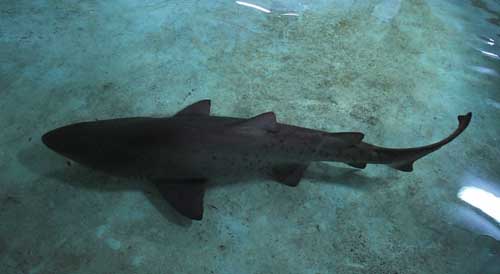Warm bodied fish, including the Great White shark, can swim more than twice as fast as other colder bodied species, according to new research.
“Warm bodied” fish, of which the Great White shark – made famous in the Jaws films – is the best known, gives them the ability to swim at cruising speeds approximately two half times faster than other similar sized cold-bodied species. This is a characteristic they share with some species of tuna and sharks.
The finding is published today in the Proceedings of the National Academy of Sciences.
Dr Yuuki Watanabe of the National Institute of Polar Research, Japan, who led the study, said, “The physiological mechanism of keeping heat in the body is well understood. But, more a fundamental question is, why this unique evolution occurred in the first place. In other words, what kind of advantages do the fish gain from being warm bodied?”
Dr Yannis Papastamatiou of the University of the St Andrews Scottish Oceans Institute is one of the team of researchers who made the discovery.

The team gathered and analysed data from previous studies as well as collecting their own data by attaching speed sensors to sharks in Alaska, the Bahamas and the central Pacific, to compare swim speeds of warm and cold-bodied fishes.
“Fishes are generally considered cold-bodied in that their body temperatures are very similar to that of the water they reside in,” said Dr Papastamatious.
“However, amazingly a small number of tunas and sharks, including white sharks, have evolved the ability to maintain their body temperatures higher than the surrounding water – sometimes up to 20°C warmer.
“We found that on average, warm bodied fishes can swim almost 2.7 times as fast as cold blooded species, likely because the warmer muscle temperatures enhances power output.”
The team also found evidence that these increased swim speeds allow some warm bodied fish to migrate large distances in a relatively short period of time.
“As such these animals can swim to distant locations and back again which may allow them to take advantage of seasonal pulses in food or other resources,” he said.
“Our study provides a potential explanation for the evolution of endothermy (being warm-bodied) in fishes.”
